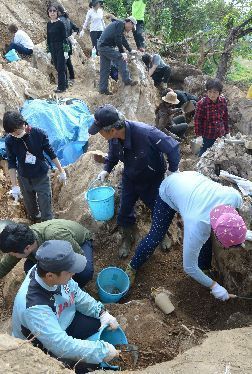Participants from Japan, South Korea, and Taiwan search for remains of Battle of Okinawa victims in Kenken, Motobu, wish for peace in East Asia

February 11, 2020 Ryukyu Shimpo
February 9 saw the start of joint excavation work by youth from Japan, South Korea, and Taiwan (organized by the Kenken Remains Excavation Joint Action Committee) on land in Kenken, Motobu where the remains of fourteen people, including two Koreans, were buried during the Battle of Okinawa.
At a spot where three to four meters of earth had been dug up by machinery, the youth carefully excavated the human remains buried in the ground.
Their work is planned to last until February 11, and the Action Committee hopes to contribute to peace-building in East Asia through the excavation work.
The excavation work started with a commemoration on the morning of February 9, where Buddhist priests read sutras and choruses of hymns were sung. Seiji Nakasone, superintendent of education in Motobu, gave a speech at the commemoration and expressed hope for the excavation, saying, “nearly 75 years have passed since the end of the war, yet still the remains of many lost lives are buried, unknown, in the fields and hills of Okinawa.
I think the families of the deceased must wish fervently to have the remains of their loved ones be returned to them so that they can give them a proper burial.”
The excavation work is being carried out with reference to old photographs of the burial site, using the position of Sesoko Island in the background as a guide, and the excavation area is being broadened gradually.
The participants of different nationalities cooperated together as they carefully brushed away the soil between rocks.
Kim Myeong Ji, 28, of South Korea’s Jeju Island, said, “I feel that it is meaningful that we were able to engage in the excavation work as people of the same East Asia regardless of nationality.”
Chang Wenyueh, 22, a senior at Waseda University who is from Taiwan, said, “Working together, talking, and communicating is important for building peace.”
Sarasa Aihara, 33, of Ginowan, who has been engaged with people in East Asia through peace parades and the like, said, “I think it’s important for people living in our generation to rethink everything, including the things that [Japan] did.”
(English translation by T&CT and Sandi Aritza)
Previous Article:“There’s no end in sight” 1,000 reservations from China visitors to Okinawa cancelled due to the corona virus, many worry will lead to decrease in domestic tourism as well
Next Article:Kumiodori celebrates 300 years, prayers for Shuri Castle
[Similar Articles]
- “Association for Returning Remains to their Homeland” established for joint Japan-South Korea collection of Battle of Okinawa remains in Kenken, Motobu, Okinawa
- Memorial ceremony held for Koreans mobilized during war, exhumation in May
- Japanese and South Korean groups to perform joint survey of Motobu burial site
- Beijing’s Ryukyuan burial sites under threat of development
- One of the largest wartime shelters discovered in northern Okinawa found in Motobu
 Webcam(Kokusai Street)
Webcam(Kokusai Street)


